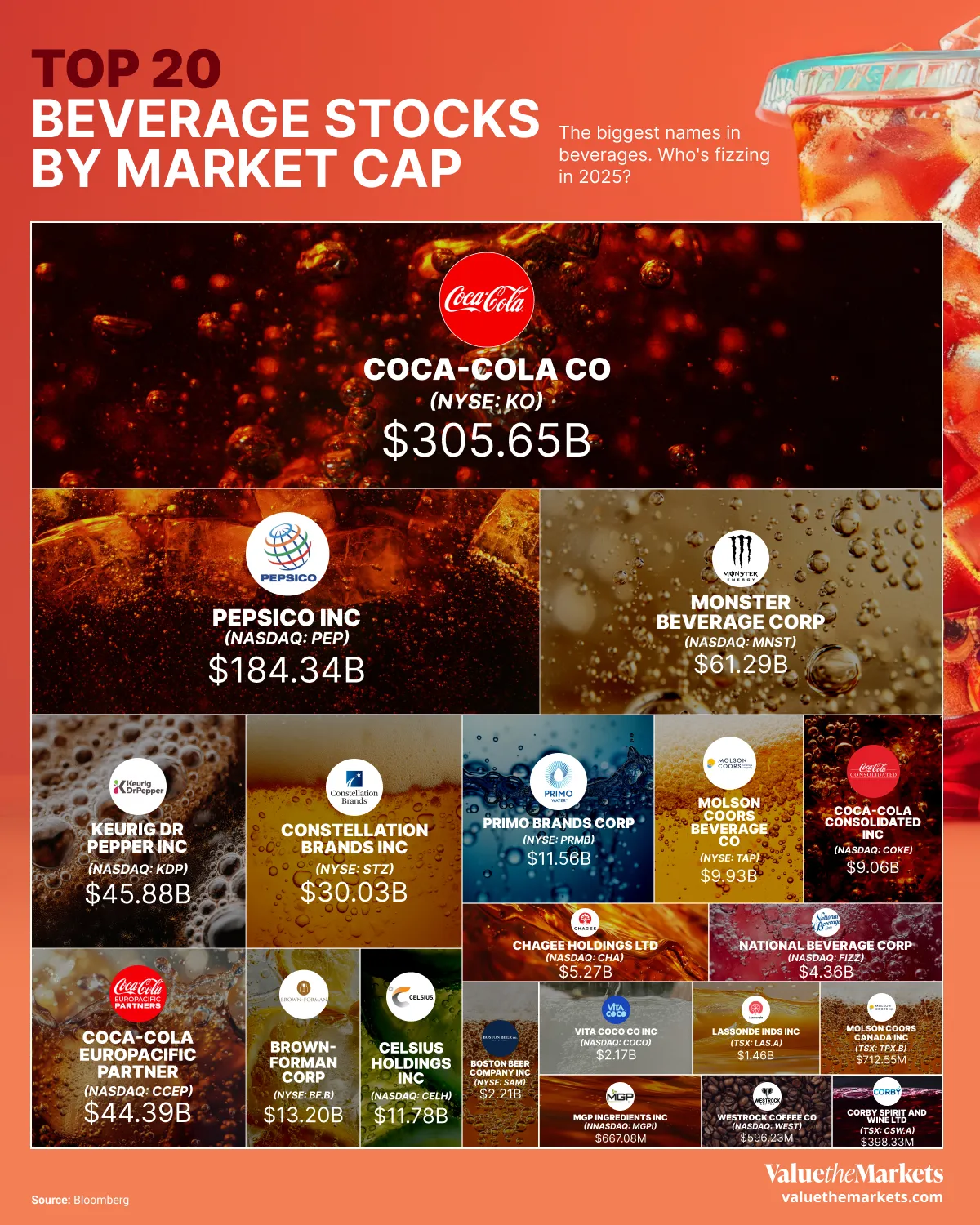
#Beverage Stocks Are Pouring Out Opportunities for Retail Investors
The beverage industry, long dominated by a few global giants, is showing signs of evolution. New entrants are gaining ground, legacy brands are defending their turf, and health-conscious trends are shaping product lines. This snapshot of the top 20 publicly traded beverage companies in North America, ranked by market capitalization, offers a clear view of the current leaders and potential risers. From Coca-Cola and PepsiCo to Celsius and Vita Coco, understanding the competitive landscape can help retail investors spot stability, momentum, or value.
#Why Beverage Stocks Are Important for Retail Investors
Stable Cash Flow: Beverage companies often benefit from consistent consumer demand, creating reliable revenue streams.
Dividend Income: Large players like Coca-Cola and PepsiCo have strong histories of paying and raising dividends.
Brand Power: Recognizable global brands often have pricing power, distribution advantages, and customer loyalty.
Defensive Sector: Beverages tend to perform relatively well during economic downturns due to steady consumption.
Growth in Niche Segments: Smaller brands are tapping into trends like energy drinks, functional beverages, and low-sugar alternatives.
#Warren Buffett’s Enduring Bet on Beverages
Warren Buffett’s long-standing investment in Coca-Cola is one of the most iconic endorsements in consumer stock history. Since first buying shares in 1988, Buffett has praised Coca-Cola’s global brand power, pricing strength, and steady cash flow, hallmarks of a classic defensive stock. The position has paid off handsomely through decades of dividends and appreciation.
While Coca-Cola remains his flagship beverage holding, Buffett has also taken smaller positions in companies like Monster Beverage and previously PepsiCo, though none have matched the conviction or scale of his Coca-Cola bet. For retail investors, Buffett’s approach underscores the value of owning durable, brand-driven businesses in the beverage sector.
#The Giants Still Reign, But Gaps Are Narrowing
Coca-Cola remains the undisputed heavyweight, with a market cap of over $305 billion. PepsiCo follows, valued at $184 billion. These two alone account for more than half the combined market cap of the top 20 names on the list. Both operate in a wide range of categories beyond carbonated drinks, including snacks, bottled water, and sports drinks.
But look beyond the top two, and there’s a steep drop-off in market cap. Monster Beverage comes in third at $61 billion. This signals that while brand legacy still holds weight, consumer trends are starting to elevate smaller, more focused players.
#Why Some Brands Have Multiple Listings
Two other Coca-Cola entities also appear in the top 20. Coca-Cola Europacific Partners (CCEP) and Coca-Cola Consolidated (COKE) are licensed bottlers that handle manufacturing, packaging, and distribution in Europe and the US, respectively. Unlike Coca-Cola (KO), which owns the brand and supplies concentrate, these bottlers focus on logistics and regional execution, earning revenue through volume sales rather than brand ownership.
Molson Coors shows up twice in the top 20 through separate listings. Molson Coors Beverage Co (TAP) is the US-listed parent company, representing the full global business, including operations in the US, Canada, and abroad. Molson Coors Canada Inc (TPX/A), listed on the TSX, reflects just the Canadian arm of the business. TAP is far more liquid and widely held, while TPX/A is more regional in scope and investor base.
#Mid-Tier Players Are Riding Consumer Shifts
Keurig Dr Pepper ($46 billion), Coca-Cola Europacific Partners ($44 billion), and Constellation Brands ($30 billion) represent the middle layer. These companies balance traditional beverage categories with diversification strategies. For example, Constellation has significant exposure to alcohol through beer and spirits, while Keurig has deep penetration in single-serve coffee systems.
This tier is attractive for investors looking for less volatile growth combined with defensible market positions. Their valuations reflect a mix of core brand strength and evolving product portfolios.
#Up-and-Comers Like Celsius and Primo Are Gaining Attention
Celsius Holdings, now valued at nearly $12 billion, has rapidly gained share in the booming energy drink segment. Its positioning as a “healthy” energy alternative has resonated, particularly with younger consumers. Similarly, Primo Brands and Vita Coco are pushing into the functional and wellness beverage space with strong growth trajectories.
These stocks carry more volatility but also offer potential upside for risk-tolerant investors. Retail investors drawn to momentum, niche brand loyalty, and thematic trends around health and fitness will find these stories compelling.
#Canadian Beverages Represent a Small But Distinct Slice
Among the 20 companies, only three are based in Canada: Lassonde, Molson Coors Canada, and Corby Spirit and Wine. Combined, they represent a fraction of the total market cap. Lassonde, with $1.4 billion in market cap, stands out as a regional player in juices and specialty drinks. These Canadian names may offer more localized exposure, often with lower liquidity but sometimes appealing dividend profiles.
While these stocks may not offer the growth potential of US peers, they can serve as diversifiers in a portfolio, particularly for Canadian investors seeking domestic holdings.
#FAQs
What’s the difference between Coca-Cola and Coca-Cola Consolidated?
Coca-Cola Consolidated is the largest independent Coca-Cola bottler in the US, with a separate business model focused on bottling and distribution rather than brand ownership.
Are beverage stocks good for dividends?
Yes. Coca-Cola and PepsiCo are known for consistent dividend payments and increases, making them popular with income-focused investors.
How do energy drink companies fit into this sector?
Energy drink companies like Monster and Celsius are fast-growing and appeal to younger demographics. They are more volatile but offer higher growth potential.
Are Canadian beverage stocks worth investing in?
They may appeal to Canadian investors for tax or currency reasons and can offer stable dividends, though growth may be slower than US peers.
Is it better to invest in legacy brands or emerging ones?
It depends on your risk tolerance. Legacy brands offer stability and dividends, while emerging names offer growth but with higher risk. A balanced approach may work best.